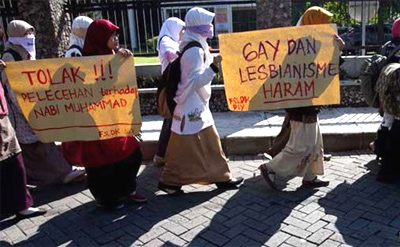Lesbians, bisexual women and transgender (LBT) people in Indonesia have been part of the women's movement for over a decade, fighting for equality for all Indonesian women.
Yet because LBT rights are not seen as women's rights by the Indonesian state, the global beacon for women's rights, the Convention for the Elimination of All Forms of Discrimination Against Women (CEDAW), does not apply to LBT people in the country.
At the CEDAW Committee's review of Indonesia held at the United Nations headquarters in New York City in July 2012, even Komnas Perempuan (the Indonesian National Commission of Women) was reluctant to raise LBT issues.
"The fundamentalists are saying that when we push for women's rights we are pushing for same-sex marriage," said one Komnas Perempuan commissioner. "If we bring up LBT, it will weaken our advocacy."
That was terrible news for LBT people, who are in dire need of support.

Two protest signs that read, "Against harassment to the Prophet Mohammed"
and "Gay and lesbians are sinful." Photo: Ardhanary Institute
The International Gay and Lesbian Human Rights Commission has been aware over time, through activists reports, that since 2008 fundamentalist thugs have been leaving threatening phone messages for LBT groups. They are stalking LBT activists and violently disrupting human rights workshops. They are using the conservative media to incite violence against LBT people.
"Prohibit liberals: Masters of gay. Breeders of homos and lesbians" is a sticker that has been posted in restaurant windows in Jakarta and a banner with similar hate language has been displayed in public spaces in this year.
Since 2010, the LGBT community has been exposed to vigilante attacks by groups like Front Pembela Islam and police complicity with the attackers in several major cities, resulting in cancellations or early closures of gatherings, including the International Lesbian and Gay Asia Conference in Surabaya, the Indonesian National Human Rights Commission's human rights training for waria (transgender women) in Depok and the Indonesian Q Film Festival in four of its seven locations. Indonesia's LGBT activists are maintaining the fight to retain their freedom of association and assembly.
Decentralization's Effects
These human rights losses grow out of the decentralization process initiated by the Indonesian government in 2001 to grant autonomy to provinces so they could govern themselves.
Religious extremists have seized the chance to create discriminatory bylaws in their provinces and enforce them in the name of morality. The worst example is in the province of Aceh, where conservative parliamentarians have implemented Sharia against sexual rights, reproductive rights, women's rights and LBT rights.
The snowballing effect of the discriminatory bylaws is that since 2008, employment discrimination and sexual bullying in schools has sharply increased throughout Indonesia, according to research by the Ardhanary Institute, a Jakarta-based center for lesbian, bisexual and transgender research, publications and advocacy.
By 2010, family violence against LBT people doubled in Jakarta, and tripled in the provinces. Lesbians – particularly lesbian tomboys – are increasingly being sexually abused by male relatives. Those who go to the police risk being blamed for provoking the violence and lectures by police officers to change their sexual orientation and gender identity. Reports on the violence were quashed by police to prevent "smearing family reputation."
More than 150 local laws in districts throughout the country now regulate how women dress, including butch lesbians and lesbian tomboys who are punished for the length of their hair and not appearing "feminine enough." Waria are punished for "acting like women." In Aceh, these laws include forcing women to cover their heads, controlling where they socialize and dictating how late they can stay out; all of which affect all women, including LBT people.
Most Egregious Law
The most egregious discriminatory local law is the Aceh adultery law passed in 2009 by religious hardliners. If this law is implemented, heterosexuals will be stoned to death for adultery and LGBT people will be caned 100 times and face 8.5 years in prison for homosexuality (defined as sexual activity outside marriage). Civil society groups have filed for judicial review with the Indonesia Supreme Court. While the new governor of Aceh is said to favor amending the law, LGBT groups fear that even if stoning is removed, the penalties for homosexuality could remain, given the lack of solidarity.
Patricia Schulz, an expert on CEDAW from Switzerland, spoke out against the entirety of the Aceh law at the July CEDAW meeting in New York City. She told the Indonesian delegation that they "represent grave violations of the rights of women to life, liberty and security."
Schulz protested to the Indonesian delegation that decentralization cannot invalidate women's human rights at the local and provincial level. "Democracy and rule of law, including anti-discrimination and equality law, have to walk hand-in-hand, at all levels of the state structure. Governments are responsible for upholding the obligations arising from ratified human rights treaties," she said.
Harkristuti Harkrisnowo, director-general of human rights in Indonesia's Ministry of Justice and Human Rights, deflected, saying, "The allegation about criminalization of LBT is incorrect because Indonesia does not criminalize LBT groups… regarding the punishment in Aceh, the law is not in place yet."
Indonesia has no sodomy law, but there are laws that disproportionately affect transgender people. The national Anti-Pornography Law classifies homosexuality as "a deviant act" punishable with jail. The Ministry of Home Affairs has not ensured that local bylaws are nondiscriminatory and in compliance with international human rights treaties ratified by Indonesia.
This article originally appeared in Women's eNews. To read the original version of this article, including quotes and a more thorough review of the CEDAW session, please visit the IGLHRC blog.
Grace Poore is program coordinator, Asia and Pacific Islands, of the International Gay and Lesbian Human Rights Commission. She can be reached at gpoore@iglhrc.org. For more information, visit www.IGLHRC.org.
